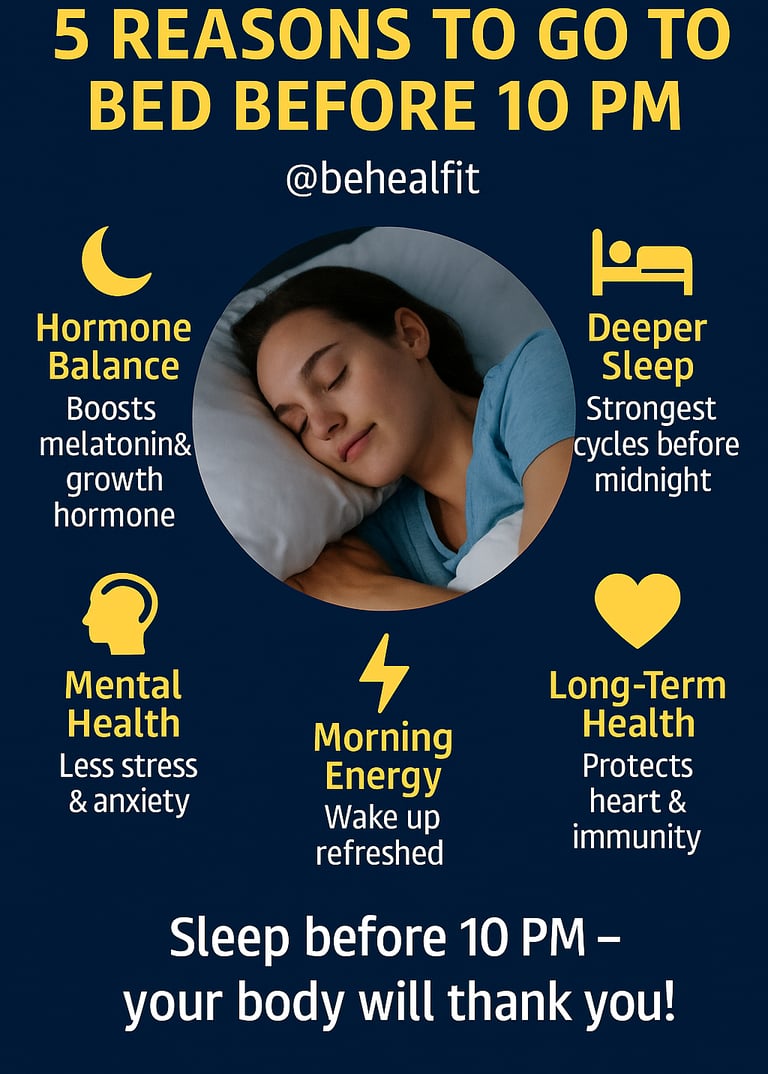Why Going to Bed Before 10 PM Is Worth It
Going to bed before 10 PM can transform your sleep, energy, and health. Discover the science-backed benefits of an early bedtime.
HEALTHBLOG-LIST
Narcisse Bosso
9/7/20252 min read


In Brief
Most people stay up late scrolling or working, but your body’s natural clock works best when you sleep earlier. Going to bed before 10 PM supports hormone balance, better energy, and long-term health. Studies show that aligning with your circadian rhythm reduces stress, boosts immunity, and improves mental clarity.
Table of Contents
Why Sleep Timing Matters
The Benefits of Sleeping Before 10 PM
Supports Hormone Balance
Improves Energy and Focus
Strengthens Immunity
Protects Heart and Metabolism
Enhances Mental Health
Tips for an Earlier Bedtime
FAQ
Conclusion
Why Sleep Timing Matters
Your body follows a circadian rhythm, a natural 24-hour clock regulated by light and darkness. Going to bed too late disrupts this rhythm, which affects hormones like melatonin (sleep hormone) and cortisol (stress hormone). Sleeping before 10 PM allows your body to repair and restore itself more efficiently.
👉 Related: Chronic Fatigue: Causes and Treatments.
The Benefits of Sleeping Before 10 PM
⚖️ Supports Hormone Balance
Deep sleep between 10 PM and 2 AM is when your body produces the most growth hormone, essential for repair and recovery.
⚡ Improves Energy and Focus
An early bedtime ensures you wake up refreshed, improving productivity, focus, and mood.
🛡 Strengthens Immunity
Quality sleep helps your immune system fight off infections more effectively.
❤️ Protects Heart and Metabolism
Poor sleep is linked to high blood pressure, diabetes, and heart disease. Early bedtime reduces these risks.
🧘 Enhances Mental Health
Going to bed earlier reduces stress, anxiety, and symptoms of depression.
Tips for an Earlier Bedtime
Create a bedtime routine: Dim lights, read, or meditate.
Avoid screens 1 hour before bed: Blue light delays melatonin production.
Limit caffeine and alcohol: Especially in the afternoon and evening.
Go step by step: Shift bedtime 15–30 minutes earlier each night until you reach 10 PM.
👉 Related: 5 Habits That Transformed My Sleep in 1 Month.
FAQ
1. Is going to bed before 10 PM necessary?
Not for everyone, but it aligns best with your natural circadian rhythm.
2. What if I’m a “night owl”?
Gradual adjustments can help reset your internal clock.
3. Can I still benefit if I sleep after 10 PM but get 8 hours?
Yes, but you may miss the optimal deep sleep window between 10 PM and 2 AM.
4. What time should I wake up if I sleep at 10 PM?
Ideally between 6–7 AM for 8 hours of rest.
5. Does early bedtime improve skin health?
Yes, deep sleep supports collagen production and reduces premature aging.
Conclusion
Sleeping before 10 PM isn’t just about getting more hours, it’s about getting better quality sleep. By aligning with your body’s natural rhythm, you support hormone balance, immunity, mental clarity, and long-term health.
💡 Action step: This week, try going to bed 30 minutes earlier each night until you reach 10 PM. Notice how your mornings (and your health) transform.
Scientific Sources
National Sleep Foundation. Why Sleep Matters for Health.
Harvard Health Publishing. Circadian Rhythm and Sleep Quality.
Walker M. Why We Sleep: Unlocking the Power of Sleep and Dreams.
Written by Narcisse Bosso, certified naturopath. His lifelong passion for health became a profound calling after a loved one passed away from a natural illness that could have been prevented with simple lifestyle changes and habits.
